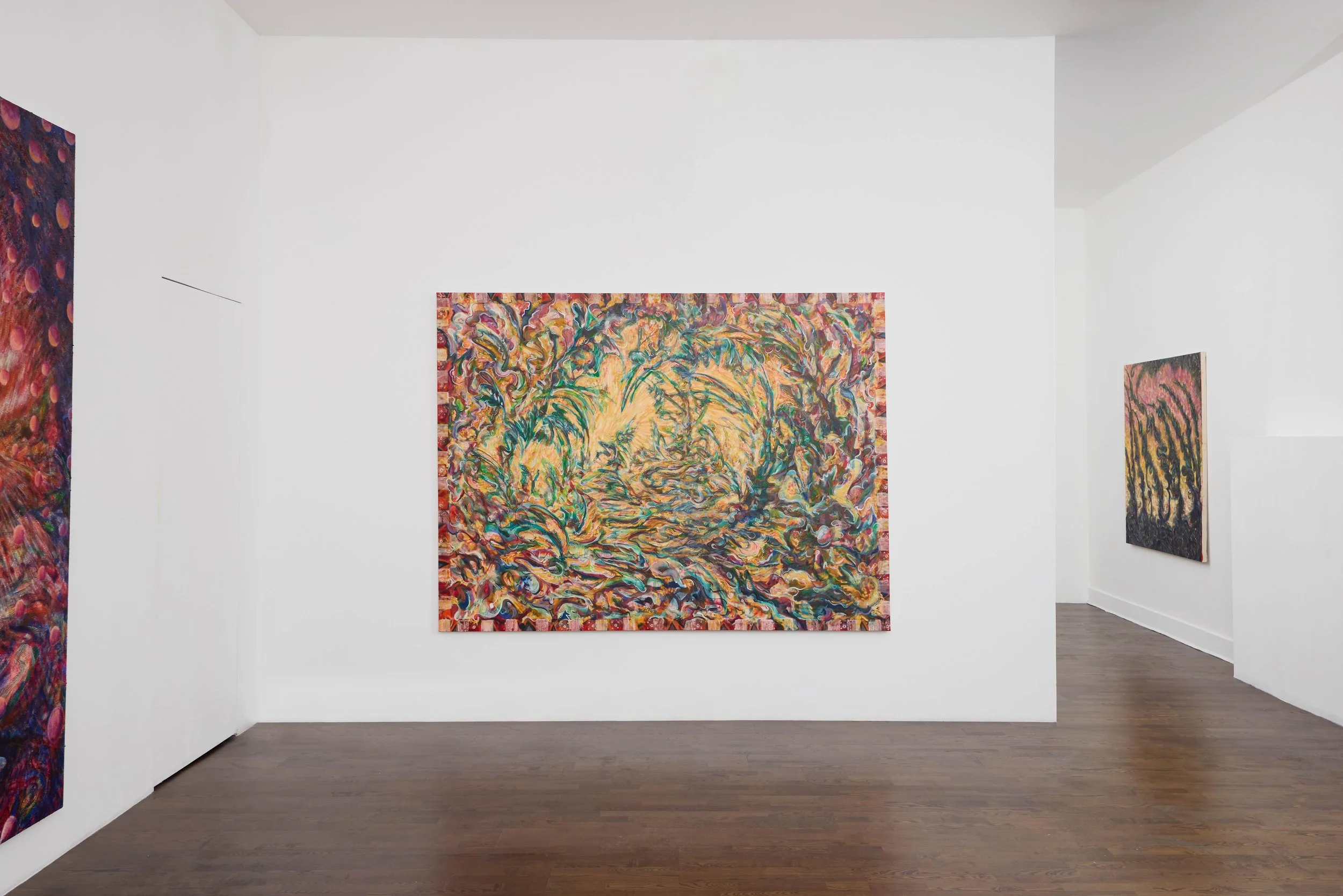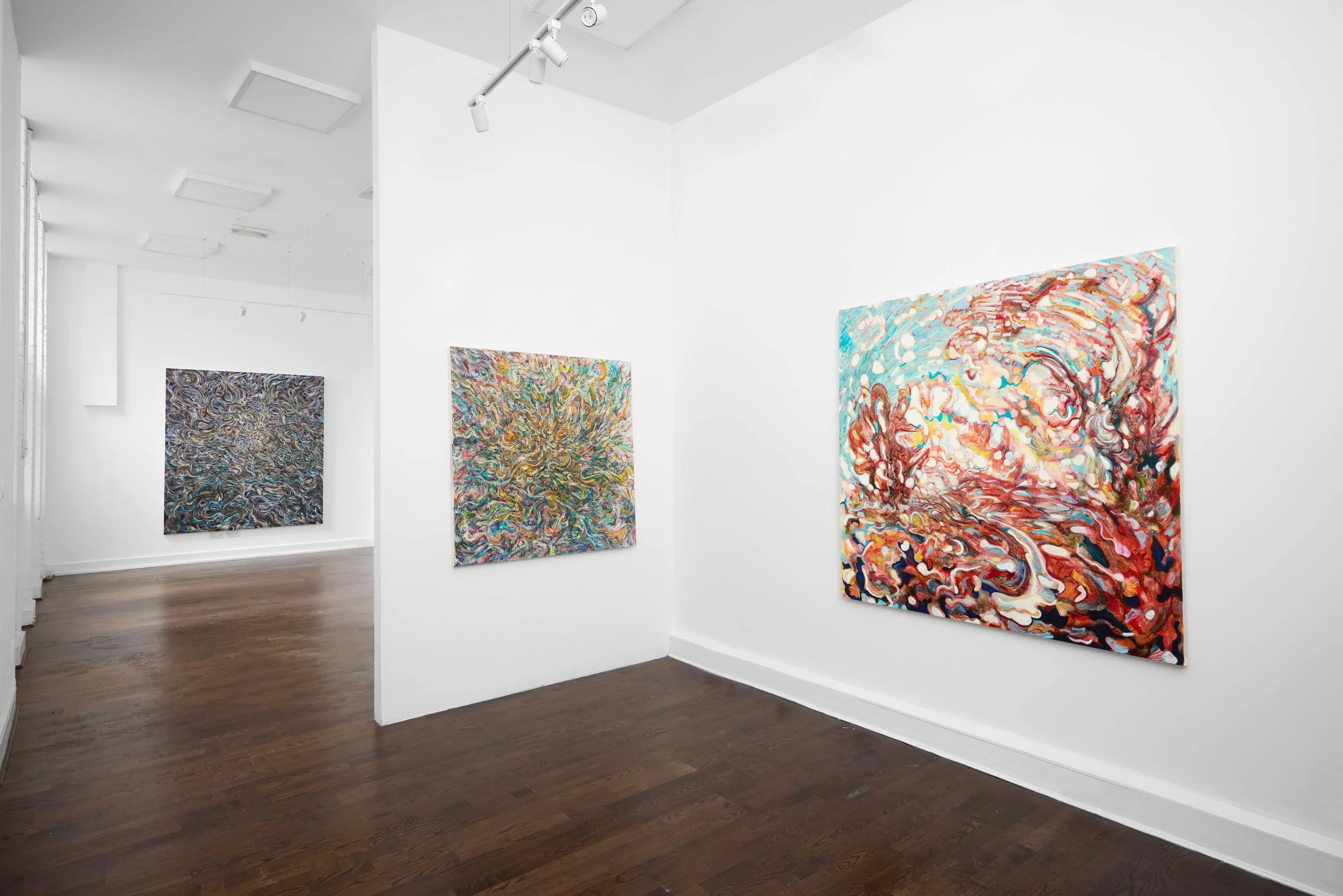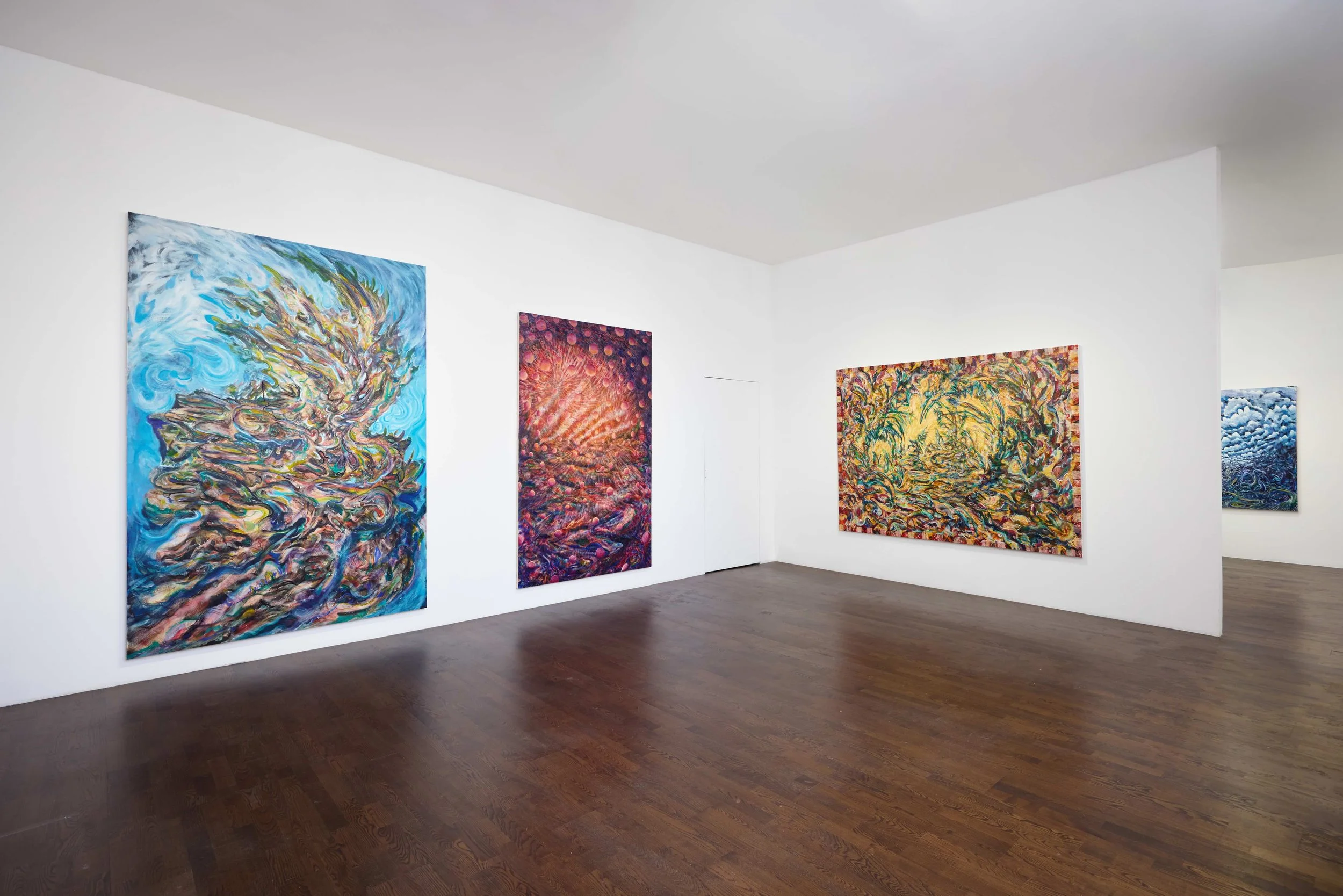
Joe Grieve: One’s Own Mystery
5 September - 2 October, 2025
PV: Thursday, 4 September, 6-8pm
Joe Grieve: One’s Own Mystery
An essay by Matthew James Holman
“We are made of the same stardust of which all things are made, and when we are immersed in suffering or when we are experiencing intense joy we are being nothing other than what we can’t help but be: a part of our world.”
– Carlo Ravelli, Seven Brief Lessons on Physics
Looking closely at the curvilinear arcs of colour which coalesce and combine in surprising formations and striking colours, one feels as though Joe Grieve’s work seeks to get the measure of the very small and the very big. ‘The energy that these paintings speak to is not just spiritual but exists in the scientific world too - the energetic realms that we exist within on a molecular level, yet cannot feel’, he writes, as well as ‘complex systems such as Electromagnetic fields, mycelial networks, quantum particles and waves which surround us.’ It is not for nothing that Grieve stresses the correspondence between his work and scientific principles. He is an artist who animates his pictures with extraordinary states of becoming, all of which feel attuned to the poetics of the physical universe: Somatic Sigh (2025) appears to smoulder with ancient fire; Crozier (2025) is constructed by a complex web of fractals, intricate patterns that repeat at various magnifications and appear similar at different scales (very close up, or very far away). What is most exciting about Grieve’s agitated and gyrating surfaces is that they mimic some of the unknowable laws of the world around us and, while never offering any solutions to that ignorance (he is an artist, not an astrophysicist), Grieve’s work enlivens joy in the mysteries of the unseen and hidden. If nothing else, he says, Grieve hopes his work will ‘transcend the literal’ and ‘explore the non-physical realm that exists beyond our immediate perception.’
Most of the universe is made up of dark energy and dark matter, mysterious substances that we cannot see but have a profound influence on the cosmos’s expansion, acting like celestial scaffolding which provides the gravitational pull needed to hold galaxies together and influence their formation and evolution. It is extraordinary truths such as these that invigorates the surface of Grieve’s paintings. In A Vast Aura (2025), for instance, pinkish spheres float around in an otherworldly ether while porous lines of incandescent light on a distant plane illuminate the scene, and a brightly covered ravine of burrowed reds, greens, and blues subsume the spheres into their midst. The title of Auric Core (2025) references the ineffable atmosphere which surrounds a living creature (‘aura’ is a bit like ‘charisma’: it’s difficult to define but you know when someone has it). Just like the impossibility of defining ‘aura’, when studying this painting we might struggle to be sure if we are witnessing, amongst other possibilities, the cellular collisions that made up the beginning of the world in abstract technicolour, or else observing a hazy summer’s evening through marbled glass. Paintings such as this operate on that porous borderline between the profound and the circumstantial: they might be a visual rendering of primordial soup (which is to say, the origins of life), or else merely their own excuse for being (the pleasure of charming colours finding form, or forms edged with the most exquisite colours). Either way, Grieve does capture something of the inexpressible in aura’s expression. These are paintings that document the dynamic overflow of energy that occupies space in the way that a dendritic pattern seizes a frozen lake.
In some respects, Grieve’s work reminds me of Cy Gavin’s near-abstractions which manage to coalesce the rudimentary shapes of the natural world, those most basic building blocks drawn from molecules and fibres, with the macro logic of geological or cosmological phenomena. For both artists, their flowing, gestural mark-making less captures what cannot ever be fully understood and transform it into a pictorial likeness to better understand it but rather stand as investigations into how painting offers a corollary to the mysteries of the material world. Other works are distinctly figurative, while never completely foreclosing an abstract sensibility that is interested above all in the atmospheric or elemental forces of the universe – its raw energy, its cyclical dynamism, its patient repose – as opposed to embodying a perfect likeness of representation. In Echoed State (2025), for instance, we can clearly see the awakening of daybreak on a high horizon line; the expanse between our vantage point and that far-off sunrise appears to be the granular ocean’s floor flooded by creeping indigo blue. For this writer at least, Grieve’s rendering of sunlight on that very distant prospect recalls the graphic power of the Mexican muralists, such as the fire-as-object in José Clemente Orozco’s Prometheus at Pomona College, Claremont, California, which is itself often seen as a metaphor for the obstacles often faced by those who seek to expand esoteric branches of knowledge from conformist authorities. Elsewhere, in Celestial Maw (2025), the artist depicts what look to be cumulus clouds spread out into the distance, enveloping an immense sky while sprawling green vegetation – wild and entangled, like a whole sea of benevolent snakes – contort all the way to the vanishing point.
Grieve made this body of work in a converted studio in west London which was formerly a Catholic church owned by a fraternity of Polish priests devoted to the ascetic teachings of Saint Francis of Assisi. Despite the clear correlation between his beatific work and ideas of spiritual revelation, the artist retreats from any formal relationship between his paintings and organized religion, even Catholicism. Later in his life, Grieve spent time in Nepalese mountains and acknowledges the influence of Buddhism and intensive meditation on his artistic practice. However, Grieve is an artist who acknowledges that all the secrets of the world are experienced individually and mediated directly and so his enigmatic title for this series – one’s own mystery – speaks to his stress on individual experience to help illuminate what he calls the ‘ambiguity of life and the forces that determine it.’





